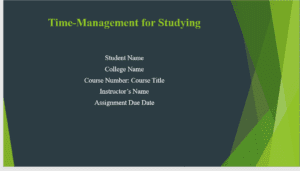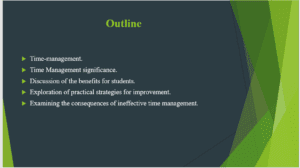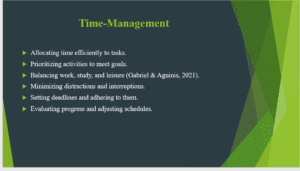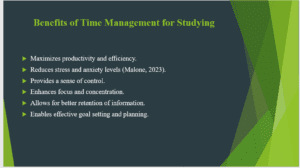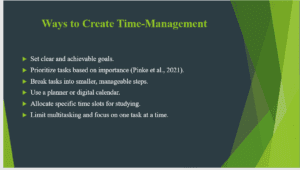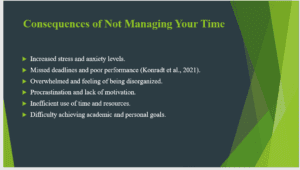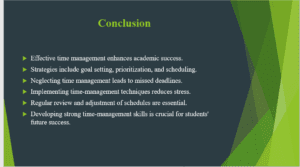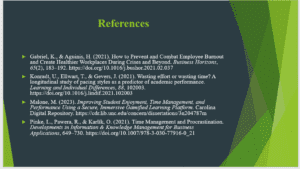Time-Management for Studying
Hello and welcome to our presentation on studying time management.
This session will discuss the significance of efficient time management for academic achievement. It will explain time management, go over its importance, and talk about the advantages it has for students. The session will also look at doable tactics to assist students become more adept at managing their time. Finally, the session will look at the fallout from poor time management and offer advice on succeeding academically
Time management refers to allocating time effectively to various tasks and activities. It entails setting priorities for tasks according to their significance and urgency in order to accomplish objectives on time. Maintaining a healthy lifestyle and avoiding burnout requires balancing work, education, and play (Gabriel & Aguinis, 2021). Reducing the time spent distracted by emails, phone calls, and social media can help students concentrate on their studies. Further, establishing and adhering to deadlines fosters a sense of accountability and urgency. By routinely assessing development, students can find areas where they need to modify their study plans or schedules to become more productive. Overall, successful time management is critical to academic achievement and ability to study.
Time management is very beneficial when studying because it boosts productivity and efficiency. Setting out distinct study time windows helps maximize study sessions and complete more in less time. By guaranteeing that assignments are finished on time and deadlines are fulfilled, efficient time management also lowers stress and anxiety levels (Malone, 2023). Because it gives students a sense of control over their responsibilities, studying becomes easier and more confident. Furthermore, effective time management improves attention and concentration by reducing interruptions and distractions, allowing students to get deeper into their study material. Additionally, because students can set aside enough time to evaluate and consolidate their learning, it helps them retain information better. Lastly, time management enables effective goal setting and planning, allowing students to set realistic study targets and create actionable plans to achieve them. Incorporating time management techniques into study routines can greatly enhance academic performance and well-being.
Organizing tasks and making efficient use of time requires multiple tactics that contribute to excellent time management. First, having specific, attainable goals gives direction to study sessions and keeps students concentrated on the tasks at hand. By setting priorities for activities, students can reduce the likelihood of procrastinating or forgetting important deadlines by focusing on the most important projects first (Pinke et al., 2021). Tasks become less intimidating when broken down into smaller, more manageable steps, which enables one to move steadily closer to their objectives. Students may see their schedule and designate precise periods for studying by using a planner or digital calendar, which helps them ensure they devote enough time to their academic endeavors. Additionally, limiting multitasking and focusing on one task simultaneously enhances productivity and concentration, allowing students to complete tasks more efficiently and effectively.
Failing to manage time effectively can harm various aspects of life. First of all, when people try to balance several obligations and fulfill deadlines without a clear plan in place, it frequently results in elevated levels of stress and anxiety. Academic and professional achievements can be negatively impacted by missing deadlines and performing poorly on tests or assignments, which may limit future chances (Konradt et al., 2021). Furthermore, the sensation of disarray and feeling overwhelmed might raise stress levels and make it harder for people to concentrate on their work. Poor time management practices frequently lead to procrastination and lack of motivation, which results in last-minute cramming and inferior work quality. Furthermore, if students use their time and resources inefficiently, they can put in more effort than is necessary on work or participate in activities that don’t advance their long-term objectives. Ultimately, the consequences of not managing time extend beyond academic performance and can impact overall well-being and ability to achieve personal and professional success.
This presentation has discussed time management’s vital role in academic performance. Students can increase their productivity and lower their stress levels by implementing tactics like goal setting, prioritization, and scheduling. Moreover, ignorance of time management can lead to tension and missed deadlines. Therefore, students must routinely examine and adjust their calendars to ensure good time management. Students must acquire good time management skills to succeed in their future academic and professional pursuits. Thank you for joining our presentation.
ORDER A PLAGIARISM-FREE PAPER HERE
We’ll write everything from scratch
Question
Please write a PowerPoint presentation explaining Management for studying
– Define time management.
– How can time management be beneficial for studying?

Time-Management for Studying
– What are ways to create time management?
– What are the consequences of not managing your time?

